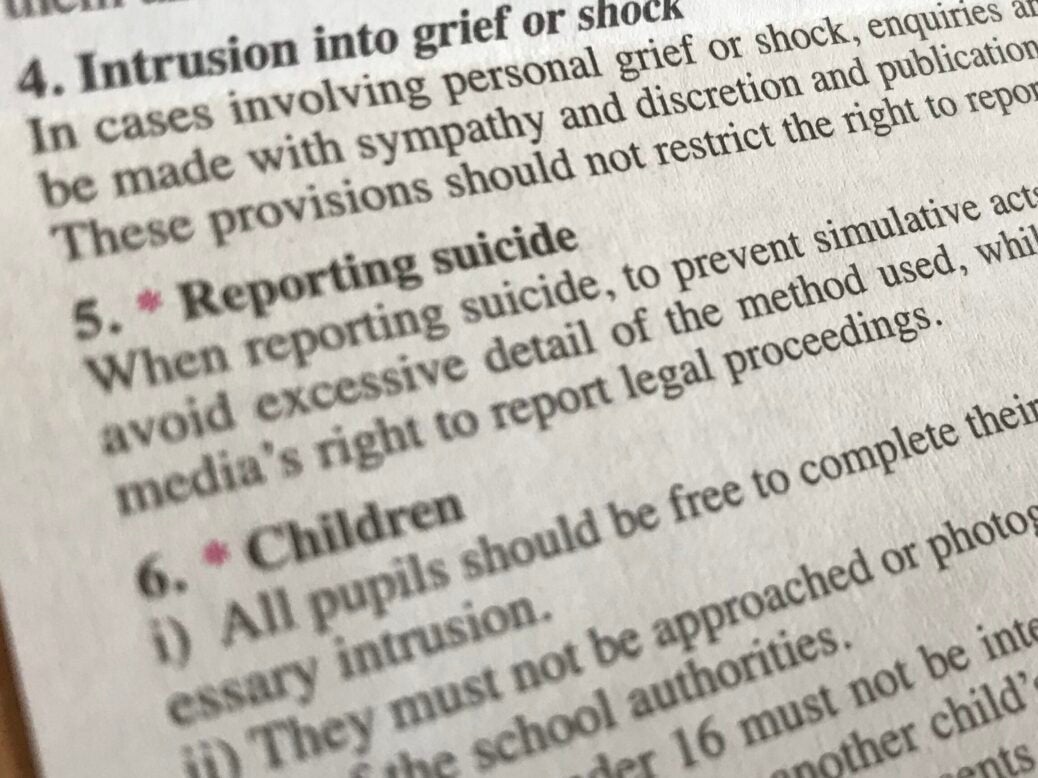
The Northampton Chronicle and Echo has been rapped by IPSO for including excessive detail in a report about a woman’s suicide.
In its coverage of the inquest into the woman’s death, the JPI Media title included details of the substance she took, the amount she ingested, what she mixed the substance with, how much it cost, where it had been purchased and the amount that could be considered a lethal dose.
The online article, headlined: “Northampton woman dies of caffeine overdose, inquest hears”, also described the woman’s 999 call expressing regret over her suicide attempt, the symptoms she experienced after the overdose and details of the treatment she received.
Details of the family’s whereabouts at the time of her death and “extensive comments” from the coroner were also included, according to the IPSO ruling.
The woman’s sister-in-law Kate Dayman complained to the Independent Press Standards Organisation about the article, published on 14 March 2018, arguing that it breached IPSO Editors’ Code rules on reporting suicide, privacy and intrusion into grief and shock.
Dayman said she was particularly concerned about the details of her sister-in-law’s suicide attempt as information on the “relatively unknown method” was difficult to find elsewhere, meaning the article could have made it easier for people to understand how they could commit suicide using the method.
She also claimed that reporting details of the circumstance around her death given during the inquest – including the woman’s symptoms, details of the families movements and the woman’s relationship and employment status – breached Clause 2 (privacy) and Clause 4 (intrusion into grief or shock) of the IPSO Editors’ Code.
Northampton Chronicle and Echo accepted that details in its report had breached Clause 5 (reporting of suicide), adding that its local news team “initially thought that this detail would serve as a warning to others, but fully understood that this was mistaken”.
The local paper added that it had removed the article from its website within 24 hours after being contacted by the charity Samaritans and said steps were taken to improve staff understanding of suicide reporting rules.
It offered to publish a public apology to the family and tribute to the woman with full copy approval – but denied any breach of Clause 2 and 4, arguing that all details included in the article were made at a public inquest and were reported without sensation.
IPSO ruled that the article breached Clause 5 but not Clauses 2 or 4. The regulator said: “The purpose of Clause 5 is to prevent the publication of material which might lead to imitative acts.
“The article had provided extensive details regarding the method of suicide the woman had used, as outlined above.
“The committee was concerned that this level of detail had been included, and the details included were sufficient to support an individual, in a number of ways, in engaging in a simulative act.
“This was concerning when the article related to a relatively unusual method of suicide, as there was a risk of increasing the awareness of this method among the population.”
While the IPSO Code Committee said it was “reassured by the publication’s response to the complaint”, the regulator ruled that Northampton Chronicle and Echo would have to publish its adjudication and keep it within the top five articles on its homepage for 24 hours.
Dayman put another complaint into IPSO about the Gloucestershire Echo report on the inquest into the woman’s death, arguing that it too had breached Clauses 2, 4 and 5 in its article.
But IPSO found no breach of Clauses 2 and 4 because the inquest was public and all reporting was factual.
It also found that the Gloucestershire Echo did not breach rules on reporting suicide as it had only included details of the substance she took and the concentration of it in her blood.
IPSO ruled that detailing the substance taken by the woman was not considered “excessive detail”.
The full IPSO ruling against Northampton Chronicle and Echo can be read here.
Email pged@pressgazette.co.uk to point out mistakes, provide story tips or send in a letter for publication on our "Letters Page" blog






